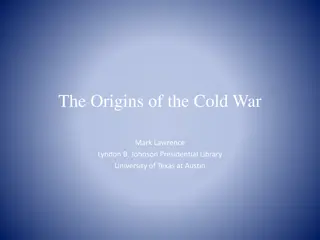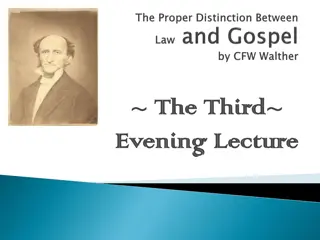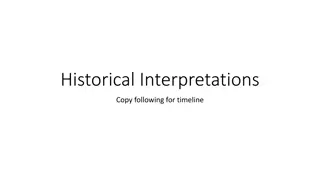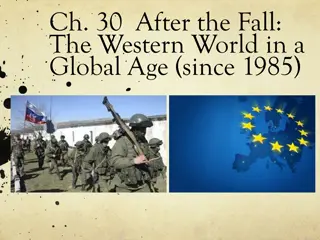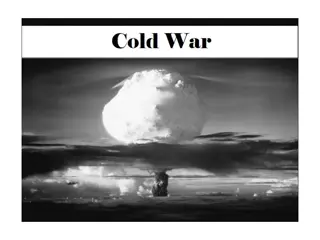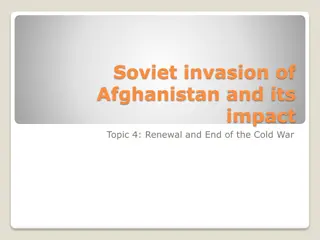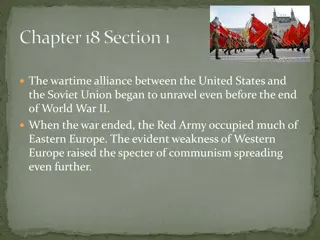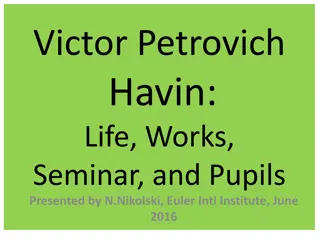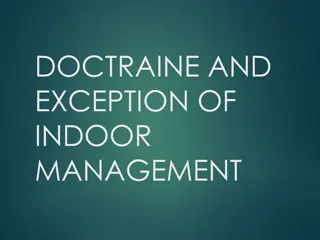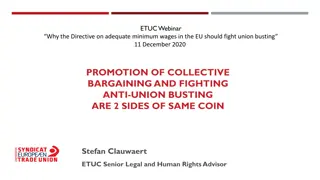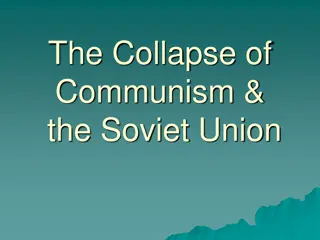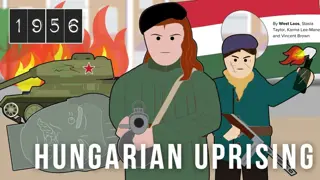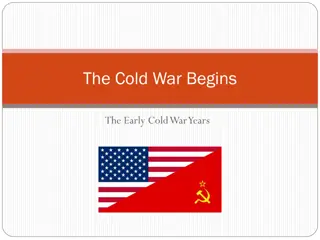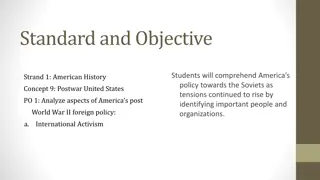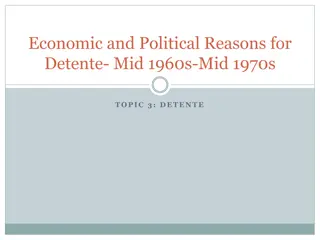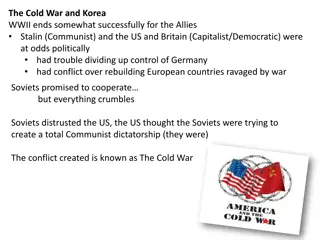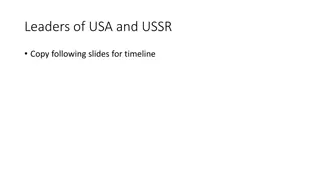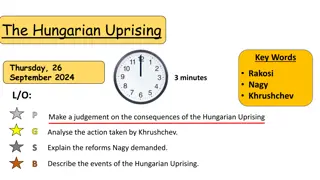The Soviet Union Post-Khrushchev: Prague Spring & Brezhnev Doctrine
Explore the aftermath of Khrushchev's ouster, the impact on the Cold War, shifts in Soviet foreign policy due to Vietnam, the Prague Spring in Czechoslovakia, and the rise of the Brezhnev Doctrine, along with key points and leadership changes during this period.
Download Presentation

Please find below an Image/Link to download the presentation.
The content on the website is provided AS IS for your information and personal use only. It may not be sold, licensed, or shared on other websites without obtaining consent from the author.If you encounter any issues during the download, it is possible that the publisher has removed the file from their server.
You are allowed to download the files provided on this website for personal or commercial use, subject to the condition that they are used lawfully. All files are the property of their respective owners.
The content on the website is provided AS IS for your information and personal use only. It may not be sold, licensed, or shared on other websites without obtaining consent from the author.
E N D
Presentation Transcript
The Soviet Union After Khrushchev The Prague Spring and the Brezhnev Doctrine
HOUSEKEEPING QUIZ NEXT WEEK RESEARCH PAPER
KEY POINTS THIS WEEK THE OUSTER OF KHRUSHCHEV AND ITS IMPACT ON THE COLD WAR THE IMPACT OF VIETNAM ON SOVIET FOREIGN POLICY DEBATES MOVEMENTS TOWARDS DETENTE THE PRAGUE SPRING: Czechoslovakia Before 1968 Motives for reform The Action Program The Societal Response: Two Thousand Words SOVIET DECISION-MAKING THE IMPACT OF THE PRAGUE SPRING
The Ouster of Nikita Khrushchev https://www.c-span.org/video/?322009-1/1964-universal-newsreel- khrushchev-resignation The Reasons: 1. His attack on the party elite: Rotation of Central Committee Other reorganizations 2. His Domestic Failures Agriculture 3. Foreign Policy Failed Brinksmanship, esp. in Cuba Problems with China Reduction of Defense Spending
The New Collective Leadership Brezhnev: General Secretary of Party Kosygin: Chairman of Council of Ministers Domestic Issues: Mature Socialism: No transformations, slow change Continuing pressure to reform, but no one strong enough to overcome bureaucratic resistance End to destalinization, but not return to Stalinism Crackdown on dissidence in USSR Barely disguised Russian nationalism
The New Leaderships Foreign Policy Great Power Politics Massive buildup of nuclear and conventional weapons Doctrine of war-fighting:how do Europeans feel about this? Attempt to improve relations with China Fails 1969 actual limited military combat Recognition of East German State still a priority Additional support for national liberation movements Also still interest in avoiding war, maintaining stable relations with US Kosygin mediates India and Pakistan conflict Question: how far to go?
Impact of Vietnam in 1965 Moves towards confrontation More support for national liberation Less willingness to talk with United States By 1967, though: USSR and US parity in nuclear weapons Vietnam ongoing, but not seen as threat to USSR Continuing Problems with China Return to offers to negotiate Johnson- Kosygin meeting in Glassboro, New Jersey, 1967
Prague Spring, 1968 How much did you learn about this in school? How was it represented? Why no Czechoslovak 1956?
A Brief History Before 1968 Why no Czechoslovak 1956? MY GUESS Gottwald dies less than two weeks after Stalin in March 1953 Novotn not as closely linked with Stalin as R kosi in Hungary Novotny makes small changes after Stalin dies No real split in Communist party ranks in 1956 as in Poland Move towards reform in early 1960s, when Khrushchev in charge Economy suffering, and reformists begin to enter Party Some movement on cultural front Reformists in KS continue to gather strength after Khrushchev s ouster as Moscow preoccupied with other issues Late 1967, reformists confront Novotn ; Brezhnev approves removal
The Prague Spring Dub ek replaces Novotn in January, 1968 Dub ek attempts to gain public trust, abolishes censorship in March Communist Party s Action Program of April, 1968 Freedom Speech, Movement and Association Economic reform: more consumer goods, some market activity Federalization of Czech and Slovak parts Foreign Policy: Loyalty to Moscow, But openness to talks with Germany Congress of KS set in September to institutionalize
The Prague Spring Moves Beyond the Party TWO THOUSAND WORDS June, 1968 Over 60 cultural figures and athletes ask people to push further The leaders' mistaken policies transformed a political party and an alliance based on ideas into an organization for exerting power, one that proved highly attractive to power-hungry individuals eager to wield authority, to cowards who took the safe and easy route, and to people with bad conscience. The chief sin and deception of these rulers was to have explained their own whims as the "will of the workers". Were we to accept this pretense, we would have to blame the workers today for the decline of our economy, for crimes committed against the innocent, and for the introduction of censorship to prevent anyone writing about these things. our dear adversaries will not give themselves a summer break; they will rally everyone who is under any obligation to them and are taking steps, even now, to secure themselves a quiet Christmas!
Two Thousand Words: Continued To begin with we will oppose the view, sometimes voiced, that a democratic revival can be achieved without the communists, or even in opposition to them. The communists already have their organizations in place, and in these we must support the progressive wing. They have their experienced officials, and they still have in their hands, after all, the crucial levers and buttons. The Czechoslovak Communist Party is preparing for its congress, where it will elect its new Central Committee. Let us demand that it be a better committee than the present one. Although at present one cannot expect more of the central political bodies, it is vital to achieve more at district and community level. Let us demand the departure of people who abused their power, damaged public property, and acted dishonorably or brutally. Ways must be found to compel them to resign . But we should reject any illegal, indecent, or boorish methods,which they would exploit to bring influence to bear on Alexander Dub ek. There has been great alarm recently over the possibility that foreign forces will intervene in our development. Whatever superior forces may face us, all we can do is stick to our ownpositions, behave decently, and initiate nothing ourselves. We can show our government that wewill stand by it, with weapons if need be,
The Soviet Decision Mastny: Soviet leadership focused on other things until early April, 1968 Other Communist leaders in Poland (Gomulka), East Germany (Ulbricht) see great dangers. June, 1968: Military maneuvers in Czechoslovakia designed to warn Dub ek to get things in order Mid-July of Warsaw Pact countries: invite KS , who don t come. Warsaw Pact sends the letter.
The Warsaw Pact Letter, July 14-15 we cannot agree that hostile forces should push your country off the socialist path and threaten to detach Czechoslovakia from the socialist community. Policies that undermine the leading role of the communist party will lead to the destruction of socialist democracy and of the socialist system. Thus, the foundations of our ties and the security of the community of our countries will be placed in danger. You know that the fraternal parties reacted to the decisions of the CPCz CC' s January plenum with understanding, believing that your party, with a firm grip on all levers of power, would direct the entire process to serve the interest of socialism . The political organizations and clubs that have recently emerged outside the National Front have essentially become staffs for the reactionary forces. The social democrats are arduously seeking to ensure that their party is formally established. The entire course of events in your country during recent months demonstrates that the forces of counterrevolution, backed by imperialist centers, have launched a comprehensive assault on the socialist system and have not been rebuffed or opposed by the party and the people's regime.
The KS Responds, July 16-17 In other words, we were fully aware of this threat We understand that the fraternal parties in the socialist countries cannot remain indifferent. However, we see no objective reason to justify either the assertion that our current situation is counterrevolutionary or the allegation of an imminent threat to the foundations of the socialist system. The overriding orientation of Czechoslovakia's foreign policy was born and endorsed in the course of the national liberation struggle and during the socialist transformation of our country. It is alliance and cooperation with the Soviet Union and the other socialist states. The communist party relies on the voluntary support of the people; it does not apply its leadino role by ruling society but by dedicated service to free, progressive and socialist developmen;!he party cannot enforce its authority; it must constantly gain it by its actions. It cannot impose its policy by decrees, but by the work of its members and by the integrity of its ideals. We are now at a point where we must wage a political battle for the policy laid down by the CPCz CC's May plenum. IL is a genuine battle; that is why there are not only victories but also setbacks. Yet the results of individual battles arc not sufficient to permit a correct assessment of the outcome of the struggle as a whole.
The Invasion Mostly Russians Very poorly run Very afraid NATO would come in, possibly ready to accept partition Brezhnev Doctrine
The Decision Politburo Meeting July 26-27: Disagreement about what to do. No clear decision, continue with political pressure Soviet leaders meet with KS leaders July 29-August 1 Decision to move toward invasion on August 6 . THE INVASION Soviets concerned, apparently not willing to fight NATO NATO has no intention of fighting Warsaw Pact Soviet military does not perform well
The Impact A Blip on the path to detente ? Arms control negotiations postponed, but continue later Mastny suggests shows that conventional war in Europe not ikely NATO exaggerates Soviet threat Soviets understand that likely to lose a conventional war No real threat left of war in Europe after 1968 The Brezhnev Doctrine Zubok talks about its impact on Communist countries In Eastern Europe: Feeling that reform not possible In Soviet Union, sense among many that ideology no longer has meaning
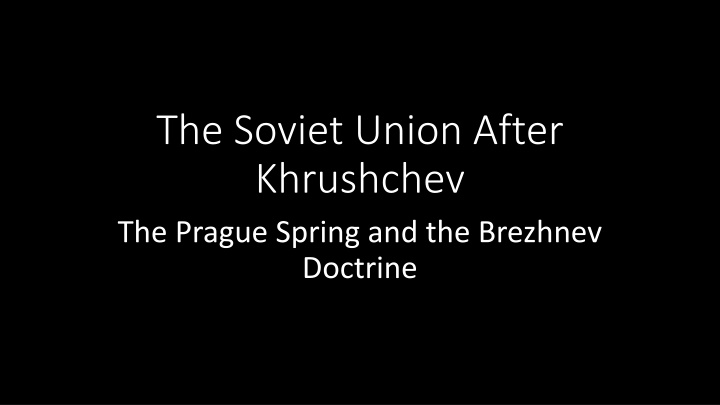

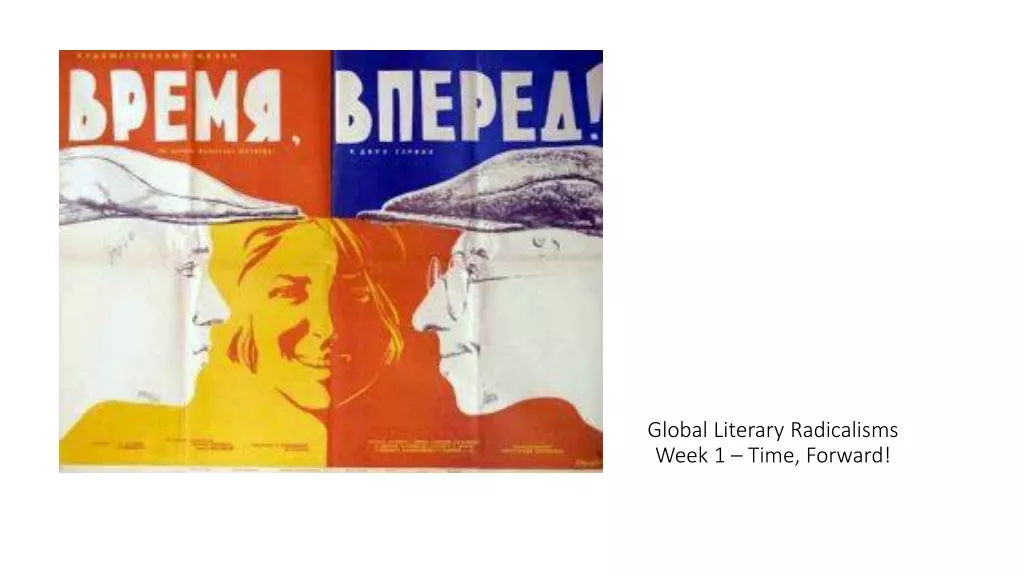
![[PDF⚡READ❤ONLINE] Energiya-Buran: The Soviet Space Shuttle (Springer Praxis Book](/thumb/21613/pdf-read-online-energiya-buran-the-soviet-space-shuttle-springer-praxis-book.jpg)

